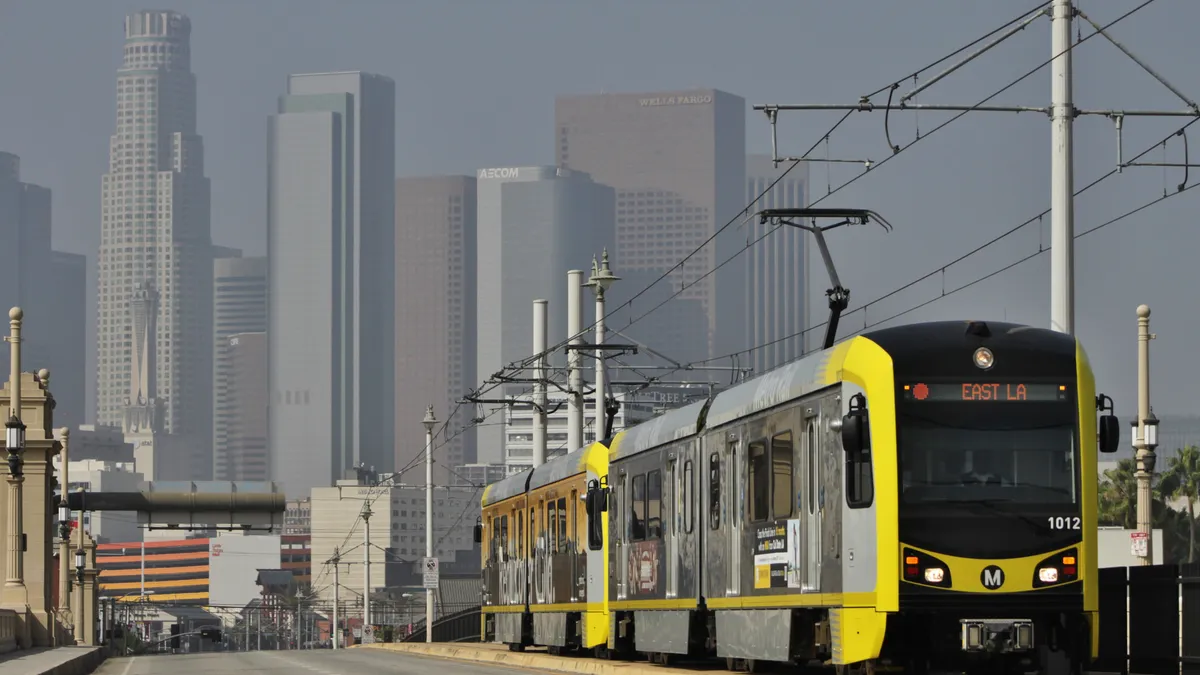UPDATE, Aug. 24: The Los Angeles City Council voted unanimously on Aug. 23 to continue consideration of a motion that would ask LA Sanitation to assess cost-saving potential for the RecycLA program at their next meeting on Sept. 6.
UPDATE, Aug. 17: The Los Angeles City Council's Energy, Climate Change, and Environmental Justice Committee voted to approve a motion that asks LA Sanitation to explore the feasibility of various cost reduction options for the RecycLA franchise system. The main proposal is allowing businesses to share refuse or recycling bins if they don't generate enough material fill up their own bins. This motion will now be considered by the full council at its Aug. 23 meeting.
Multiple council members have reported high volumes of calls from angry constituents about large rate increases and surprise service changes. One council member called the program implementation "tremendously flawed" in a letter to the committee chair. City officials recognized the need for better communication during the committee's Aug. 15 meeting, but maintained that customers could still see rates balance out once they consulted with city waste auditors. Though they also made it clear that some level of price increase should be expected.
"We are moving more and more toward a landfill-free city, a landfill-free society. That brings with it significant changes, and important changes in behavior. Sometimes they do come with additional costs," said LA Sanitation Director Enrique Zaldivar during the committee meeting, as reported by SoCal Patch.
Dive Brief:
- Just a few weeks into its transition phase, the RecycLA franchise system is spurring complaints about missed service and higher rates, according to the Los Angeles Times. The details include stories of double-digit percentage increases for some customers in commercial establishments and large multi-unit residential buildings.
- In response, two councilmembers, Mitchell Englander and Bob Blumenfield, introduced a motion on Aug. 4, outlining concerns from customers saying they're paying too much for separate bins that aren't full. The motion asks LA Sanitation to report back within 30 days on "next steps" for allowing customers to share bins and a "commensurate fee structure" for such a system.
- LA Sanitation, with the seven companies selected to service the city's 11 franchise zones, officially began the transition process in July. Dozens of auditors are in the process of visiting each of the system's 80,000 customers over the next six months to consult with them on their waste generation habits and find ways to divert more material. The RecycLA system will take full effect in early 2018.
Dive Insight:
The RecycLA system has been in the works for many years, but since it received final approval from the Los Angeles City Council in December 2016, things have been moving fast. Companies have been lining up the necessary equipment, city staff have been working to publicize details and auditors have begun fanning out across the city. Earlier this year, reports emerged about some companies that weren't selected for zones abandoning their customers or closing up shop entirely. Other late-stage surprises, such as a pending lawsuit from the Apartment Owners Association of California, and the discovery of 15,000 more customers than expected, have added further complications.
Introducing the largest commercial waste franchise system of its kind in the country was never expected to be simple. Some companies opted out of the bidding process after deciding expectations were too high. Others, drawn by the appeal of 10-year contracts with possible extensions, signed on even at the risk of financial penalties if they don't meet high waste reduction targets and other requirements.
The accompanying labor and environmental benefits that are baked into the system have been heralded as a win for the city, even if some customers aren't thrilled about the price increases that come with them. Yet as supporters of the system have pointed out, current or upcoming requirements set by multiple California laws would have eventually led to higher costs anyway. Food waste diversion, available for an additional cost in green bins, is mandated for many commercial establishments. Standard recycling, available for free in blue bins, is necessary to hit a statewide diversion target of 75% by 2020. Costs may go down as the system evens out, and efforts to alter anything about the plan, aside from the city's communication strategy, are seen as premature by some of the system's designers.
Local officials, industry players and advocacy groups in other cities that are considering similar set-ups are surely watching the progress. New York's Department of Sanitation recently awarded a long-term contract to a team of consulting firms to begin crafting plans for their own organized collection system and has been in close contact with their LA Sanitation counterparts. St. Paul, MN, is working toward its own version of organized collection and the topic has also been discussed in early terms elsewhere.















